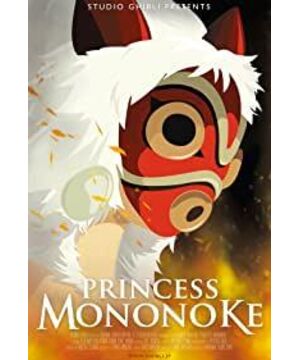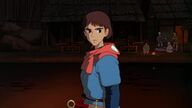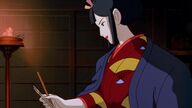I thought of this movie when my Chinese teacher talked about "Wolf Totem", and I suddenly had a lot of thoughts. The teacher was talking about the contradiction of human nature-the irreconcilability of naturalness and sociality.
We define human nature as the dual attributes of naturalness and sociality. This has a very sharp distinction in the film.
Naturalness: The mountain god represented by Sang.
Sociality: The people of Dada City, the monk and the warrior under the leadership of Magic Ji.
Asdakar is a neutrality between the two parties, and it is also an image of a thinker seeking answers.
In the film, the contradiction between Magic Ji and Sang is a main thread. In my opinion, this contradiction has two aspects:
1. The over-exploitation and utilization of nature by humans.
In the film, the overexploitation of the human side represented by Magic Ji has caused the irreversible destruction of the mountains and forests, making the mountain god represented by Sang angry. They feel that they have been violated and feel that nature has been destroyed and they are extremely resentful. So Sang launched various sneak attacks and interventions, large and small, in an effort to smash mankind. But all this was unsuccessful.
Can we make it clear which is right and wrong under this contradiction? can not.
First of all, Magic Ji should be a character that should be respected. Magic Ji represents people who survive in harsh social and natural environments. They came to the forest to build Dada City with their innate desire for a better life. Together, they worked together to develop iron artillery. On the one hand, they resisted the samurai shogunate's exploitation and on the other hand they resisted Sang's harassment and interference.
Her use of nature can be said to be a last resort, because people can't survive if they don't use it. Now that this is true, the use of muskets, which I am most uncomfortable with, is taken for granted at the beginning. People have just adopted better ways to protect themselves to exploit resources to survive.
Are we uncomfortable with their exploitation of nature or their insatiable plunder?
In fact, Magic Ji neither uses resources for her own benefit, she does not have dresses or luxury houses, and the living standards of the villagers are extremely limited. Is this insatiable? In other words, is the human pursuit of a better and more comfortable life wrong? Has human development and plunder interfered with the lives of Sang and the mountain gods? no. When we look at the actions of human beings from Sang's standpoint, we feel resentful, but standing on the side of Magic Ji is indeed excusable.
Secondly, Sang is a positive role. She represents the harmonious force of nature. She was nurtured by wolves and (abandoned by humans) she has a deep love and sense of responsibility for the mountains and forests. Although she has shaken her identity in the film, (social calling), at least, she is opposed to the typical human side. She is brave, simple, kind, and has a sincere love for nature. Her character is a concentrated explosion of human nature.
When the mountain god is angry and the forest is noisy, she is the leader, she represents the powerful call of nature. Represents the natural wailing and anger under the destruction of human beings. Therefore, all of her actions cannot be described as "war elements" or "violent elements." Become the image of the most beautiful daughter of nature in our hearts.
2. Humans' contempt and disrespect for nature.
This contradiction is also quite obvious in the film.
First of all, the villagers of Asdakar have great respect for the mountain god. Despite the attack of the Cthulhu, the lives of the villagers were in jeopardy, and the grandfather did not allow Asdaka to shoot him. The phrase "will be cursed" represents human beings' awe of the mountain god from the bottom of their hearts. After the death of the Cthulhu, the old woman's apology to the Cthulhu's corpse and a series of actions all represent the respect and awe of nature on the human side of Asdakar. This is the source of Asdakar's deepest understanding of Sang.
Secondly, Magic Ji does not respect or even challenge the mountain god. "Watch me shoot the deer god" This is her self-confidence in her own strength and an equal dialogue with nature. Therefore, human beings in this area have lost their reverence for nature, and they are even less likely to repent of what they have done.
The predecessor and epitome of this industrial culture are the natural emotions of human beings.
And Sang's maintenance of nature conflicts with this contempt. The mountain god she represents felt the loss of dignity, felt that he was challenged, and felt the decline of the race, all of which were bred by the increasing challenges of mankind.
Both of the above two contradictions embody the contradiction between the natural side and the human side. Reflected in the protagonist Asdaka, it is a strong collision between naturalness and sociality.
He not only felt the deepest understanding of Magic Ji's side, he felt that the ethical relationship between people, the harmonious emotions between people and people's pursuit of a better life for themselves were just and deserved. He respected Magic Princess and was moved by the harmonious relationship between the people in Dada City (and finally returned to Dada City). I also feel respect and admiration for Sang, and feel that the large-scale activities and wars of the natural side are normal. I also feel pity for the destruction of nature.
He is an image of a thinker and has been trying to reconcile these two contradictions, but in the end Gong Lao didn't seem to have a result, let alone Asdakar.
The deer god encourages Asdakar to live, obviously in recognition of sociality. After his death, he dyed the mountains and wilds green and became a flowering grandfather, which was an obvious reservation of naturalness.
Asdaka said to Sang: I will live in Dada in the future, and you will live in the forest. I will ride a "white horse" across the river to see you~. ^_^ This is another rather ambiguous answer that Gong Lao gave to the above question. Will the people in Dada stop destroying the forest? Will not. Will Sang stop protecting the forest? Will not. However, Asdakar's answer is: live together.
Then let the two contradictions that cannot be reconciled continue to coexist, and let human beings continue to find the answer and live with nature! Someone asked: Is this a naive and beautiful daydream or the best answer that Gong Lao has no choice but to come up with? I just think this is the best answer we can think of right now.
View more about Princess Mononoke reviews










